Mediterranean Cookbook Essentials: Your Guide to Classic Flavors

Embarking on a culinary journey through the Mediterranean is a celebration of flavors that are as vibrant as the regions from which they hail. The Mediterranean diet has long been celebrated for its delicious and healthful approach to eating, featuring an abundance of fresh vegetables, fruits, whole grains, nuts, and lean proteins, often highlighted by the use of heart-healthy olive oil. As you explore the pages of a complete Mediterranean cookbook, you will discover a tapestry of dishes that are not only simple to prepare but also steeped in centuries of tradition and cultural heritage.
A comprehensive Mediterranean cookbook serves as a guide through the diverse cuisines of the coastal Mediterranean countries. Each recipe is more than just a set of instructions; it’s a story of the land and its people, carefully crafted to bring the essence of Mediterranean life into your kitchen. You will learn about the harmonious pairings and unique cooking techniques that define this cuisine, alongside guidance on how to select the right ingredients to recreate authentic flavors. Your dining table will turn into a vibrant feast for the senses, satisfying a quest for both nourishing meals and gastronomic adventure.
Key Takeaways
- Becoming familiar with Mediterranean cuisine offers a delectable range of healthful and traditional recipes.
- This cookbook serves as your guide to understanding and preparing authentic Mediterranean dishes.
- Your experience with these recipes will provide new cooking techniques and nutritional insights.
Fundamentals of Mediterranean Cuisine
Mediterranean cuisine is characterized by its reliance on a variety of fresh, wholesome ingredients. Your familiarity with this diet can lead to both enjoyable cooking experiences and nutritional benefits. Check at Aladdin Mediterranean Cuisine.
Understanding the Mediterranean Diet
The Mediterranean diet emphasizes the consumption of olive oil, vegetables, grains, fruits, and legumes as staples. It promotes eating fish and poultry over red meat and prioritizes fresh, minimally processed foods over refined products. This way of eating is not only about enjoying delicious meals but also appreciating their nutritional information and health benefits.
Essential Pantry Ingredients
To effectively prepare Mediterranean dishes, your pantry should be stocked with certain key items. Here’s a brief list:
- Olive Oil: A cornerstone ingredient used for cooking and dressings.
- Whole Grains: Such as quinoa, bulgur, and farro.
- Legumes: Include a variety like lentils, chickpeas, and beans.
- Nuts and Seeds: Almonds, pine nuts, and sesame seeds for texture and nutrients.
- Herbs and Spices: Basil, oregano, rosemary, thyme, cumin, and coriander are essential for authentic flavor.
- Canned Goods: Tomatoes and artichokes for convenience without sacrificing taste.
- Dairy: Feta and Greek yogurt for a creamy component.
This pantry building approach supports the creation of uncomplicated dishes with vibrant taste and flavor.
Kitchen-Tested Techniques
Mediterranean cooking includes a variety of simple yet effective techniques. To ensure dishes with authentic flavors, consider the following:
- Sautéing with Olive Oil: Start most recipes by sautéing aromatic ingredients in olive oil.
- Grilling and Broiling: These methods enhance the natural flavors of vegetables and proteins.
- Slow Cooking: Develops depth of flavor in legumes and stews.
- Fresh Herbs: Adding them at the end of cooking preserves their vibrant taste.
Incorporating these methods into your cooking routine can introduce you to the full spectrum of flavors present in Mediterranean cuisine.
Recipe Collection and Pairings

When embracing Mediterranean cuisine, you’ll discover a trove of over 500 recipes that celebrate seafood, meat, and plant-based ingredients, reminiscent of regional flavors and traditions. Each pairing and tag is carefully selected to enhance the dining experience, whether you’re preparing a quick meal in your Instant Pot or arranging an array of small plates for guests.
Seafood and Meats
Mediterranean food places emphasis on fresh, high-quality seafood, high-quality seafood and meats. Your cookbook features :
- Seafood: Expect recipes like Grilled Octopus with Olive Oil and Lemon, and Instant Pot Seafood Couscous. Pair these dishes with a crisp white wine or light-bodied red for a perfect match.
- Poultry and Meat: Learn to cook classics like Lemon Herb Chicken and Slow-Cooked Lamb Shoulder. These recipes often feature tags such as “gluten-free” or “ideal for leftovers.”
Vegetarian and Plant-Forward Recipes
Your collection is rich in vegetarian and plant-forward recipes, featuring:
- Vegetarian Meals: Recipes like Eggplant Parmesan and Stuffed Bell Peppers take the center stage, often incorporating legumes for added protein.
- Plant-Based Plates: Embrace the full bounty of the garden with dishes such as Chickpea Falafel and Spinach Lentil Soup, showcasing how Mediterranean cuisine.
Sweets and Breads
Round off your meal with sweets and breads that epitomize Mediterranean indulgence:
- Sweets: Delicacies like Baklava or Greek Yogurt with Honey are perfect for a touch of sweetness. Pair these with a strong coffee or a sweet dessert wine.
- Breads: Dive into recipes for crusty loaves or flatbreads like Pita or Focaccia. These staples pair excellently with a variety of dips and spreads.
Health and Nutrition Guide
Incorporating the Mediterranean diet into your lifestyle not only tantalizes your taste buds but also contributes positively to your overall health through nutritious meal plans and natural ingredients.
The Benefits of Mediterranean Eating
The Mediterranean diet emphasizes eating primarily plant-based foods, whole grains, nuts, fruits, and beans, which are key components of nutritional health. When you adopt this diet, you’ll rely less on processed foods and more on fresh, nutrient-dense ingredients. For example, whole grains like rice and pasta are staple foods, offering a healthy energy source along with B-vitamins and minerals. Vegetarian meals are frequent in a Mediterranean cookbook, introducing variety and reducing meat consumption, thus reducing the risk of heart disease.
Meal Planning and Nutrition
When planning your meals, focus on balancing variety and nutrition. Start by selecting a whole grain such as quinoa or barley, pair it with a lean protein like fish or eggs, and fill half of your plate with a colorful assortment of fruits and vegetables. Keep in mind the ease with which Mediterranean meals can be prepared, often with minimal cooking time, allowing for a nutritious meal even on a busy schedule. Adhering to nutritional guidelines without sacrificing flavor is a hallmark of the Mediterranean diet. San Francisco Book Review praises the diet for being as delicious as it is healthful.
For nutritional balance, consider the following meal components:
- Proteins: eggs, fish, beans
- Whole grains: rice, whole wheat pasta
- Vegetables and fruits: spinach, tomatoes, oranges
- Fats: olive oil, nuts
By utilizing these nutritional information principles in your meal planning, you’re setting the stage for a diet that’s not only rich in taste but also beneficial for your long-term health benefits.
Cooking and Serving

The essence of Mediterranean cooking is about combining nutrition with satisfying flavors. This section will assist you in incorporating the healthful and vibrant essence of the Mediterranean diet into your daily meals, whether you’re preparing a simple weeknight dinner or entertaining guests.
Weeknight Dinners and Entertaining
For weeknight dinners, focus on simplicity and time efficiency. Your meal planning can include a variety of vegetables, whole grains, and lean proteins such as fish, beans, and eggs. Here’s a basic structure to get started:
- Main Course:
- Use whole grains like quinoa or brown rice as a base. Cook in bulk to save time.
- Sauté a generous portion of vegetables in olive oil. Season with fresh herbs and a pinch of salt for taste.
- Protein Addition:
- Include a portion of grilled or baked fish seasoned with lemon, garlic, and pepper.
- Alternatively, opt for plant-based proteins like chickpeas or lentils.
For entertaining, Mediterranean food shines with its versatility and shareability. A typical menu could look like this:
- Appetizers:
- Variety of olives and spiced nuts.
- A platter of sliced tomatoes drizzled with olive oil and sprinkled with feta cheese.
- Main Spread:
- A showpiece dish like lamb or fish baked with medley of peppers.
- A side of pasta tossed in a light tomato sauce with basil and capers.
Pair meals with a glass of red wine from the Mediterranean region to complement the flavors and potentially offer some health benefits when consumed in moderation.
Global Influences and Techniques
Your cooking repertoire can benefit from incorporating techniques inspired by global influences. Mediterranean cuisine has been shaped by the exchange of ideas and flavors across the Mediterranean Sea. Here’s how you can adopt these techniques:
- Frying in Olive Oil:
For deeper flavors, fry spices like cumin and coriander in olive oil before adding them to your dish. - Baking with Whole Grains:
Use whole grain flour for homemade bread or pizza dough, adding a rich, nutty flavor and enhancing the nutritional content. - Grilling:
Vegetables and proteins alike benefit from the smoky taste grilling offers. Brush items with olive oil and season with herbs before placing them on the grill.
Remember, the key is to enhance the natural flavors of your ingredients without overpowering them, allowing the quality of the fresh produce to stand out in every meal.
Frequently Asked Questions

This section addresses common inquiries about Mediterranean cookbooks, providing guidance on the top choices for beginners and experienced cooks alike.
What are the top-rated Mediterranean diet books for beginners?
For beginners, “The Mediterranean Diet for Beginners” by Rockridge Press and “The Complete Mediterranean Cookbook” by America’s Test Kitchen are highly regarded. These publications are praised for their straightforward approach and introduction to the Mediterranean lifestyle.
Which is the most comprehensive Mediterranean cookbook available?
“The Mediterranean Cookbook” by Marie-Pierre Moine is noted for its breadth, covering over 500 recipes from all regions of the Mediterranean. It is considered a definitive guide for those looking to immerse themselves in the cuisine.
Where can one find a Mediterranean cookbook in PDF format?
Mediterranean cookbooks in PDF format can often be found on digital book platforms like Amazon Kindle or Google Books. Some publishers may also offer PDF versions for purchase or free download on their official websites.
What are some essential Mediterranean ingredients for home cooking?
Essential Mediterranean ingredients include olive oil, fresh vegetables like tomatoes and eggplants, legumes, whole grains, fish, and a variety of herbs such as oregano, basil, and thyme. These staples form the foundation of the Mediterranean diet.
Can you recommend a Mediterranean diet cookbook with easy-to-follow recipes?
“The Weeknight Mediterranean Kitchen” by Samantha Ferraro provides easy-to-follow recipes suitable for busy weeknights. The book is appreciated for its practical tips and flavorful, quick dishes.
What are the benefits of following a Mediterranean diet according to popular cookbooks?
Popular cookbooks highlight the Mediterranean diet’s benefits for heart health, its role in promoting longevity, and its effectiveness for weight management. The diet is rich in fruits, vegetables, lean proteins, and healthy fats, which are all conducive to a well-balanced and nutritious lifestyle.





